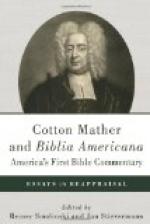|
This section contains 4,996 words (approx. 17 pages at 300 words per page) |

|
SOURCE: "Cotton Mather and the Puritan Transition into the Enlightenment," in Early American Literature, Vol. VII, No. 3, Winter, 1973, pp. 213-24.
In the following essay, Vartanian argues that Mather was able to rectify his ideas on piety and the relationship between God and reason with the teachings of the Enlightenment, including the concept of a mechanistic world.
Caught by the more spectacular public drama of colonial America's "progress" from darkness to enlightenment—a transition as remarkable as the Enlightenment itself—historians have slighted the unprecedented ease with which many Puritans privately stepped across the threshold. Historians, failing to recognize the ease of this accommodation, have sought to explain that larger cultural transition in terms of conflict. Additionally, reading late-nineteenth-century issues back into the eighteenth century has artificially dramatized the tensions between secular and clerical thought over the relationship between religion and science. Though tensions did exist, they were more...
|
This section contains 4,996 words (approx. 17 pages at 300 words per page) |

|


